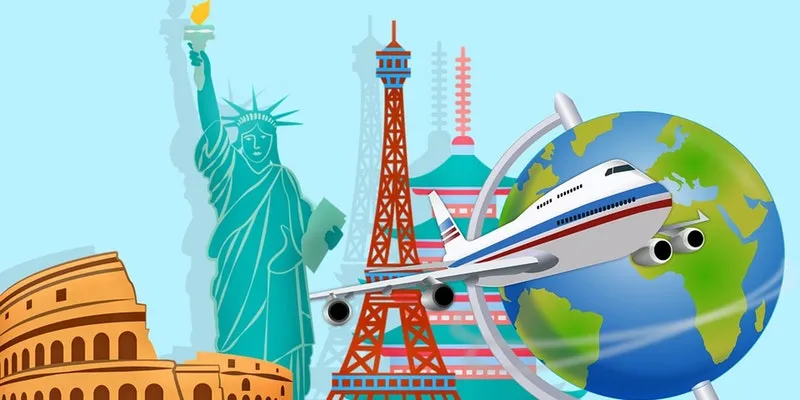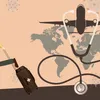[Startup Bharat] How small-town travel tech startups are tiding over the coronavirus crisis
With limited source of revenue and funding, travel tech startups from non-metros are having a tough time due to the coronavirus pandemic. However, they are adapting to the new normal in order to sustain their business.
The travel and tourism industry has taken a huge hit in the face of the coronavirus pandemic. While the industry was already facing issues due to the global economic slowdown, the pandemic has only added to the stress, as both tourism and business travel shutdown due to domestic and international travel ban.
Travel tech startups, both from metros and non-metros in the country, have been forced to suspend operations temporarily, and are facing huge losses. This has resulted in furloughs, layoffs, and salary cuts, which has gravely affected the workforce. While the losses in the organised sector can be recorded, the unorganised sector is facing unprecedented and scattered losses.

Illustration credit: Vijeesh MR
According to the World Travel and Tourism council (WTTC), a staggering 100 million jobs are at risk globally in the travel and tourism industry due to the coronavirus pandemic, and it might take up to 10 months for the sector to return to normalcy.
With more than 60 percent hotels shut in India, many being used as isolation wards, and international borders still sealed, the possibility of immediate recovery seems bleak.
Apart from this, small-town startups operating in the sector have been facing some additional challenges, including lack of funds, no revenue, interstate tensions, etc.
Despite the mounting problems, some startups have come up with a range of measures and solutions to tide over the crisis. From working on new marketing strategies to provide safe and secure quarantine facilities, to rolling out travel plans, startups are doing it all to regain the trust of customers.
They are also using the pandemic time to take maximum certifications, accreditations, associate with maximum tour operators as well as to brainstorm and work on newer ways to ensure safe travel for customers.
“Every difficult situation presents us with an opportunity to become better in the future. Places that witnessed an overflow of tourists each season or maybe round the year can utilise this time to evaluate the issue at hand, ranging from sanitation to environmental concerns and come up with better solutions to mitigate the burden for a fresh wave of tourism,” says Varun Vagish, a travel influencer and the Founder of Mountain Trekker, a travel-specific YouTube channel.
Managing revenues
With ‘social distancing’ and ‘stay at home’ becoming the new norm, the travel industry got stalled in the months of March and April after the government announced the lockdown. Around the same time, airlines and others decreased ticket prices after seeing a drop in bookings.
This gradually led startups to fall short of revenues. For most startups, the revenue came down from less than 20 percent to almost nil by May. Online travel booking platforms have also seen a huge dip in their bookings, which has affected the tour operators listed on these platforms.
Yajnesh T, Co-founder and CEO of Kannur-based travel booking startup, FareFirst, says,
“As of now, the revenue generation is 10 percent compared to pre-COVID times. We are now seeing flight bookings only in the domestic region in the country.”
Similarly, Dewakar Baset, Founder of Gangtok-based educational travel startup Invacations, which connects students from institutes across the country with Northeast India and vice-versa, says, his company had a decent number of institutional bookings from March to May 2020.
“Our teams were geared up to aggressively reach out to newer geographies across India promoting Sikkim and the North East of India. The numbers looked very promising for us if the season was normal, but COVID acted as a spoilsport, and now there is no business at all.”
Dewakar, however, believes that things will shape up eventually, and with its product mix that is in the pipeline, the startup will be able to manage and also do well in the times to come.

Making the alternatives worse for small town startups is the lack of funds. Jitesh Yadav of Jalandhar-based Trrivel says that being a non-metro travel startup, the pandemic hindered the team to raise funds to sustain themselves in the coming times.
“Being a startup from Tier-II town, it is really difficult for us to sustain due to the lack of funding. Big competitors might be facing similar problems like us, but they can innovate and implement to new normal faster and efficiently than us because they have investor backing,” says Jitesh.
However, being a bootstrapped startup, Trrivel had savings that helped it sustain in the first three months. But Jitesh says that if the pandemic is here to stay longer, his team will fear that they will run out of savings and will have to reach out to investors for help.
Interstate tensions
Dewakar says: “Another challenge has been the non-conformity of states for opening their borders for tourists. For a startup from non-metro, the odds are stacked up more because of the difficulty of reaching out to clients in person and assuring them of safe travel. As an organisation dealing with student travel, it might take us a little longer than anticipated,” says Dewakar.
Jitesh too echoed a similar opinion. He says, even when the restrictions are raised and inter-state movement of domestic tourists is allowed by the government, startups fear that they will not be able to organise trips like before.
Technology to the rescue
Travel influencers and startup founders are of the opinion that with technology, there is always a ray of hope.
People today are seeking the comfort of online booking to avoid direct interaction with agents. In the coming months, there might be more involvement of technology in the sector.
“The travel-tech industry, which democratised travel and made tourism more affordable than ever, will play a monumental role in the post-COVID times,” says Varun.
He further adds that technology has a huge potential in mitigating this crisis and ensuring safer travel by replacing manual checking measures with robots, computer vision, artificial intelligence (AI), virtual reality (VR), etc.
Countries are also turning to biometric systems and AI for face recognition technologies to make travel safer. Other than this, virtual assistants, chat bots, smart cars, and other devices can help people streamline their itineraries, keeping their safety as priority.
“The travel tech industry is focussing more on the safety of travellers. Travel tech products will provide information on how safe the destination is and how safe the carriers are. They will also provide government organisations all the information about travel, identifying the number of people at a time at a destination and who all they are interacting with, so that it will comply to the COVID-19 standards,” says Krishna Kumar of Kochi-based .
According to estimates of various travel companies, it will take anywhere between 12 to 18 months for the industry to get back at 50-60 percent of the bookings as before, provided the situation improves.
Travelling post COVID-19
For the next one year, travel will probably be only necessity based, and there will be more focus on sustainable travelling.
“We need to reassure travellers that travelling in the post-COVID world is safe. Additionally, companies will need to provide proper sanitation procedures at every point to reassure the safety of the travellers,” says Yajnesh.
It will also be the responsibility of travel-tech startups to ensure a steady flow of travellers. This will depend on how travel enthusiasts will start promoting niche destinations that are safe for travelling. Additionally, the fear, stigma, and mental roadblocks in resuming travel need to be turned around.

Further, the tourism industry is planning to come up with new travel concepts, where camping, solo-travel, and offbeat destinations will be preferred over popular attractions, which are usually crowded.
Krishna Kumar says, “Like other industries, travel industry will also adapt to the new normal, and people will travel more to nearby places. A new term called ‘5 mile tourism’ is being coined, where people will travel to places in the radius of five miles.”
There will certainly be a paradigm shift in the travel industry post COVID-19. Health, hygiene, and social distancing will be some of the prerequisites. Added to it, the competition will be fierce, with every state wanting to garner as many tourists as possible.
However, timely intervention by individuals and the government along with the use of technology can turn out to be long term assets in the industry.
Edited by Megha Reddy


![[Startup Bharat] How small-town travel tech startups are tiding over the coronavirus crisis](https://images.yourstory.com/cs/2/79900dd0d91311e8a16045a90309d734/startuptravel-1594126875884.png?mode=crop&crop=faces&ar=2%3A1&format=auto&w=1920&q=75)







